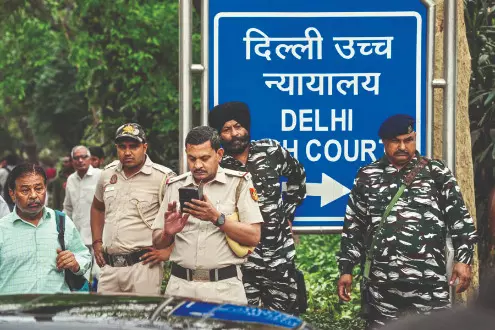HC denies relief to cancer-afflicted NDPS accused and orders ‘best treatment’ in jail

NEW DELHI: The Delhi High Court has refused to extend the interim bail of a cancer-afflicted woman accused in an NDPS case and directed prison authorities to provide her “best possible treatment”.
Justice Girish Kathpalia was hearing the plea of Jyoti, booked under the Narcotic Drugs and Psychotropic Substances (NDPS) Act for allegedly possessing 480 gram of heroin.
On June 13, the court noted the submissions of her counsel, who said the accused was suffering from a rare type of cancer for which the jail dispensary had no treatment.
Jyoti, who was accused in four NDPS cases, was granted bail in three cases, and as her regular bail plea in the present case was listed on July 4, she sought extension of her interim bail.
“Additional public prosecutor strongly opposes the interim bail application, taking me through antecedents of the accused or applicant, who is involved in 29 criminal cases, including four cases under the NDPS Act and 25 cases under the Delhi Excise Act and the accused is already declared a ‘Bad Character’ of the area,” the court said.
Jyoti’s medical records, it came on record, indicated she was suffering from Chronic Myeloid Leukaemia, diabetes and some other ailments.
“The ailment, unfortunately, suffered by the accused, is certainly a significant factor, but I find substance in the submission of the prosecutor that it is not an ailment of temporary kind. The ailment can certainly be taken care of even during her stay in jail,” the court said. The judge, however, referred to her antecedents and said they could not be ignored.
“It is also specifically directed that the jail authorities shall provide the best possible treatment to the accused and if so desired by her, she would be taken in custody to the hospital(s) of her choice and shall be provided with all the prescribed medicines at the cost of the exchequer, since she would be in custody,” it ordered.
The court trashed the prosecutor’s argument that she couldn’t be provided treatment at the cost of the exchequer in a medical facility of her choice but taken to government hospitals for appropriate treatment.
“I cannot accept this submission. Once liberty is curtailed, the prisoner is in state custody. Medical treatment involves trust in the doctor, which aids recovery, so the patient’s choice of doctor should not be denied,” the judge said.



